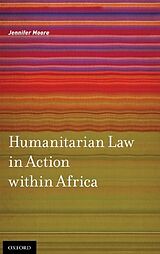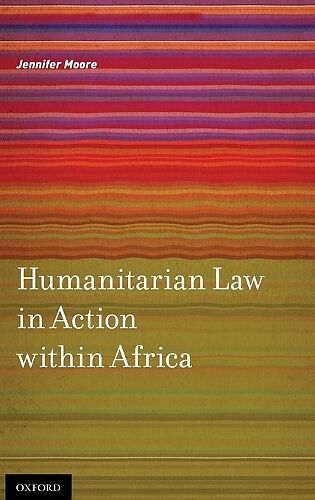Humanitarian Law in Action within Africa
Einband:
Fester Einband
EAN:
9780199856961
Untertitel:
Englisch
Genre:
Internationales Recht
Autor:
Jennifer Moore
Herausgeber:
Oxford Academic
Anzahl Seiten:
384
Erscheinungsdatum:
19.04.2012
ISBN:
978-0-19-985696-1
Zusatztext Due to its interdisciplinary focus and comparative approach! Moore's book is accessible to experts and lay readers from diverse backgrounds. She continuously links elements under discussion to her case studies and establishes comparisons between different fields of law! legal instruments! and institutions! as well as to the US. Where possible! the author substantiates her points with illustrative examples. Informationen zum Autor Jennifer Moore is a Regents Professor of Law at the University of New Mexico School of Law and was Director of UNM Peace Studies. She has worked for the U.N. High Commissioner for Refugees, first as an associate protection officer in West Africa, then as a legal officer in Washington, D.C. Professor Moore received her J.D. from Harvard and was a recipient of a Fulbright Scholarship. Klappentext In this book, Jennifer Moore studies the role and application of humanitarian law by considering the experiences of African countries that are emerging from civil wars. Moore first offers an overview of international law, including its essential vocabulary, and then describes four particular subfields of international law: international humanitarian law, international human rights law, international criminal law, and international refugee law. After offering readersthis important backdrop, Moore turns to practical mechanisms necessary to implement international humanitarian law, focusing specifically on the experiences of Uganda, Sierra Leone, and Burundi. This study of humanitarian law, despite its focus on Africa's experience, is important to conflictresolution and reconstruction throughout the world. Zusammenfassung In Humanitarian Law in Action within Africa! Jennifer Moore studies the role and application of humanitarian law by focusing on African countries that are emerging from civil wars. Moore offers an overview of international law! including its essential vocabulary! and describes four particular subfields of international law: international humanitarian law! international human rights law! internationalcriminal law! and international refugee law. After setting forth this overview! Moore considers practical mechanisms to implement international humanitarian law! focusing specifically on the experiences of Uganda! Sierra Leone! and Burundi. Through the case studies of these countries! Moore describes transitional justice's fundamental components: criminal! social!and historical. Although the African continent has gone through some of the world's greatest humanitarian emergencies! issues such as violence against women! child soldiers! and genocide are not unique to Africa! and as such! the study of humanitarian law by examining Africa's experience is important to conflict resolution and reconstruction throughout the world. INTRODUCTION ; PART I: INTERNATIONAL LEGAL RULES FOR CONFLICT RESOLUTION ; CHAPTER 1: THE HUMAN FUNDAMENTALS OF INTERNATIONAL LAW ; CHAPTER 2: HUMANITARIAN LAW: THE LAW OF ARMED CONFLICT ; CHAPTER 3: HUMAN RIGHTS LAW: THE LAW OF HUMAN DIGNITY ; CHAPTER 4: INTERNATIONAL CRIMINAL LAW: ACCOUNTABILITY FOR CRIMES OF WAR AND CRIMES AGAINST HUMANITY ; CHAPTER 5: INTERNATIONAL REFUGEE LAW: PROTECTION FOR INDIVIDUALS FLEEING PERSECUTION AND ARMED CONFLICT ; PART II: HUMANITARIAN LAW AND POST-CONFLICT RECONSTRUCTION IN AFRICA ; CHAPTER 6: TOOLS FOR IMPLEMENTING HUMANITARIAN LAW: COURTS, TROOPS, MEDIA, DEVELOPMENT AND COMMUNITIES ; CHAPTER 7: BEYOND JUBA IN UGANDA: RECONCILING RESTORATIVE AND RETRIBUTIVE JUSTICE ; CHAPTER 8: AFTER LOME IN SIERRA LEONE: THE SPECIAL COURT AND NATIONAL RECONCILIATION ; CHAPTER 9: APRES ARUSHA AU BURUNDI: "DESARMER LE COEUR POUR DESARMER LE CORPS" ; CONCLUSION ...
Due to its interdisciplinary focus and comparative approach, Moore's book is accessible to experts and lay readers from diverse backgrounds. She continuously links elements under discussion to her case studies and establishes comparisons between different fields of law, legal instruments, and institutions, as well as to the US. Where possible, the author substantiates her points with illustrative examples.
Autorentext
Jennifer Moore is a Regents Professor of Law at the University of New Mexico School of Law and was Director of UNM Peace Studies. She has worked for the U.N. High Commissioner for Refugees, first as an associate protection officer in West Africa, then as a legal officer in Washington, D.C. Professor Moore received her J.D. from Harvard and was a recipient of a Fulbright Scholarship.
Klappentext
In this book, Jennifer Moore studies the role and application of humanitarian law by considering the experiences of African countries that are emerging from civil wars. Moore first offers an overview of international law, including its essential vocabulary, and then describes four particular subfields of international law: international humanitarian law, international human rights law, international criminal law, and international refugee law. After offering readers this important backdrop, Moore turns to practical mechanisms necessary to implement international humanitarian law, focusing specifically on the experiences of Uganda, Sierra Leone, and Burundi. This study of humanitarian law, despite its focus on Africa's experience, is important to conflict resolution and reconstruction throughout the world.
Zusammenfassung
In Humanitarian Law in Action within Africa, Jennifer Moore studies the role and application of humanitarian law by focusing on African countries that are emerging from civil wars. Moore offers an overview of international law, including its essential vocabulary, and describes four particular subfields of international law: international humanitarian law, international human rights law, international criminal law, and international refugee law. After setting forth this overview, Moore considers practical mechanisms to implement international humanitarian law, focusing specifically on the experiences of Uganda, Sierra Leone, and Burundi. Through the case studies of these countries, Moore describes transitional justice's fundamental components: criminal, social, and historical. Although the African continent has gone through some of the world's greatest humanitarian emergencies, issues such as violence against women, child soldiers, and genocide are not unique to Africa, and as such, the study of humanitarian law by examining Africa's experience is important to conflict resolution and reconstruction throughout the world.
Inhalt
INTRODUCTION ; PART I: INTERNATIONAL LEGAL RULES FOR CONFLICT RESOLUTION ; CHAPTER 1: THE HUMAN FUNDAMENTALS OF INTERNATIONAL LAW ; CHAPTER 2: HUMANITARIAN LAW: THE LAW OF ARMED CONFLICT ; CHAPTER 3: HUMAN RIGHTS LAW: THE LAW OF HUMAN DIGNITY ; CHAPTER 4: INTERNATIONAL CRIMINAL LAW: ACCOUNTABILITY FOR CRIMES OF WAR AND CRIMES AGAINST HUMANITY ; CHAPTER 5: INTERNATIONAL REFUGEE LAW: PROTECTION FOR INDIVIDUALS FLEEING PERSECUTION AND ARMED CONFLICT ; PART II: HUMANITARIAN LAW AND POST-CONFLICT RECONSTRUCTION IN AFRICA ; CHAPTER 6: TOOLS FOR IMPLEMENTING HUMANITARIAN LAW: COURTS, TROOPS, MEDIA, DEVELOPMENT AND COMMUNITIES ; CHAPTER 7: BEYOND JUBA IN UGANDA: RECONCILING RESTORATIVE AND RETRIBUTIVE JUSTICE ; CHAPTER 8: AFTER LOME IN SIERRA LEONE: THE SPECIAL COURT AND NATIONAL RECONCILIATION ; CHAPTER 9: APRES ARUSHA AU BURUNDI: "DESARMER LE COEUR POUR DESARMER LE CORPS" ; CONCLUSION

Leider konnten wir für diesen Artikel keine Preise ermitteln ...
billigbuch.ch sucht jetzt für Sie die besten Angebote ...
Die aktuellen Verkaufspreise von 6 Onlineshops werden in Realtime abgefragt.
Sie können das gewünschte Produkt anschliessend direkt beim Anbieter Ihrer Wahl bestellen.
Loading...
Die aktuellen Verkaufspreise von 6 Onlineshops werden in Realtime abgefragt.
Sie können das gewünschte Produkt anschliessend direkt beim Anbieter Ihrer Wahl bestellen.
| # | Onlineshop | Preis CHF | Versand CHF | Total CHF | ||
|---|---|---|---|---|---|---|
| 1 | Seller | 0.00 | 0.00 | 0.00 |
